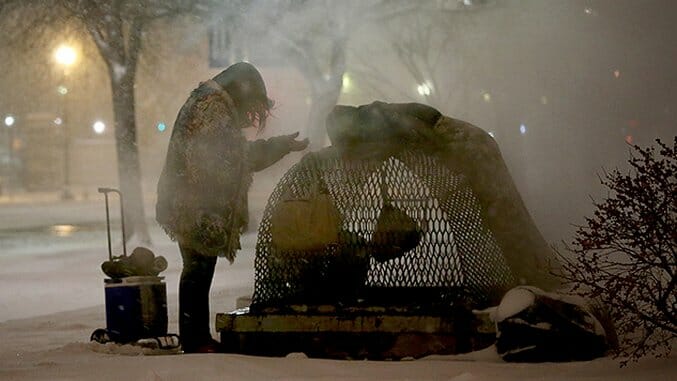Denver Police Confiscate Blankets From Homeless
Images courtesy of Getty photojournalists John Moore, Spencer Platt, Win McNamee & David McNew
Shame on the Denver Police Officers who took blankets and tents into evidence after confiscating them from homeless people camped outside in temperatures which will dip into negative numbers this week. Criminalizing homeless individuals is not only cruel and abusive, it is counterproductive and unconstitutional.

This isn’t the first time this year Denver city administrators have criminalized homelessness. In March, officials used money from a homeless donation fund project taking place at the Denver International Airport to pay a $60,000 bill to move, store and redistribute property confiscated from homeless people during a sweep in Denver’s Ballpark area. Yes, you read that right. The city went to elaborate lengths to install donation meters around the airport, collect money from concerned citizens who wanted to “help the homeless”, and then spent the money on a taskforce who told the homeless to move it along, to a shelter, or to jail. Can’t have the homeless people scaring off the wealthy suburban families coming into the city to see the Rockies at Coors Field, now can we?

These – let’s call them what they are – raids on poor people are occurring in major cities across America. A survey of homeless Hawaiian residents reported 60 percent of homeless individuals losing personal identification, 40 percent losing tents and 21 percent losing medication during sweeps of homeless encampments. Homelessness has been declared a public emergency in Los Angeles, with many of the estimated 26,000 homeless in L.A. living in riverbeds and storm drains. As of June 2013, there were an all-time record of 50,900 homeless people, including 12,100 homeless families with 21,300 children homeless in New York City. It’s not just happening in metropolitan cities, but in poor rural areas as well. In other words, homelessness is a national crisis. And people should be pissed at what just happened in Denver.

Being wrapped in a blanket is the first comforting experience most people have shortly after coming into this world. Swaddling is an ancient tradition and the idea that a blanket is a safe haven is one shared by all cultures. If you’re reading this, you have access to the internet, to electricity, and to some kind of shelter. It’s nearly impossible to imagine that you have none of those things. To imagine instead that all you had was a blanket, or a tent if you were damn lucky. To imagine those sworn to serve and protect you taking it all away as evidence in return for a citation and order to appear in front of a judge to pay a fine you cannot afford. To imagine it was going to be -2 degrees this week. To imagine figuring out your next move from inside a storm drain, the only safe haven you can find. To imagine doing it all without so much as a blanket.

The videos of Denver police officers confiscating blankets from the homeless have gone viral, and forced the Department of Public Safety to address the ensuing controversy. The Department admitted to confronting over 4,700 people living in homeless encampments in Denver this year while at the same time attempting to excuse the behavior of it’s officers. The statement, which you can read in full here, said “the goal of the City is to provide and connect people with services and shelter, of which there is an adequate amount.”

The officers seen on multiple videos state that they are following lawful orders, despite promises by Denver Mayor Michael Hancock that law enforcement officials would not be permitted to take vital resources away from homeless citizens suffering through the Denver winter. The Mayor’s Office was also forced to issue a statement as a result of the controversy, claiming that over the last two years the city has placed 995 homeless people into housing. Like the Department of Public Safety, the Mayor’s Office claims there are beds available for anyone who wants them.
“Every night, we have beds open for people to sleep. We absolutely have space open”, claims Denver Mayor Michael Hancock.
-

-

-

-

-

-

-

-

-

-

-

-

-

-

-

-

-

-

-

-

-

-

-

-

-

-

-

-

-

-

-

-

-

-

-

-

-

-

-

-












































